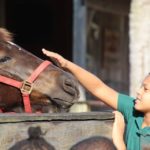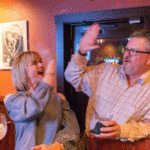INDIAN RIVER COUNTY — When disaster hits, the two biggest priorities are protecting human life and property, but the Humane Society’s Disaster Animal Response Team training put four-legged, feathered and furry life right up there with people this weekend.
A group of 77 trainees from across Florida converged at the Humane Society of Vero Beach for a three-day workshop that certified them as trained disaster animal volunteers. The training focused not only on animal handling, first aid, shelter management and emergency procedures that would bring needed help to animals in the event of a hurricane, fire, flood or other disaster, the course taught the volunteers how to properly interact with first responders and government agencies during a confusing crisis. In 1996, the national Humane Society formalized various modes of disaster training that had been used for years and established the DART course and certification. Attendees paid $80 for the three days of instruction and hands-on training.
Through education, the Humane Society is hoping to prevent the need for an onslaught of lost, stranded or injured animals during a disaster. The newly certified animal disaster team is charged with not only taking the message out to civic an animal advocacy groups, but also with promoting animal disaster preparedness to everyone they know who has pets, livestock or other domestic or exotic animals in their care.
“We’re teaching them how to prepare, in advance, the animal community to assist the public in preparing their pets for a disaster,” said Connie Brooks of the Tampa Bay-area Society for the Prevention of Cruelty to Animals, who was brought in to teach a good portion of the course.
Brooks said the idea is to have local teams of trained volunteers who can be mobilized and dispatched to other geographic areas to respond to a disaster. She said her group from the west coast of Florida has assisted in Vero at times when the Humane Society was inundated with animals needing care and shelter.
Some of the volunteers were inspired to attend not only due to the advent of hurricane season, but also because of the looming possibility that Indian River County could be impacted by oil from the BP Gulf spill, should currents and weather conditions bring the oil our way.
Tammy Wagner and Mike Etter, both veterinary technicians at St. Francis Animal Hospital in Vero Beach, signed up after Humane Society Education Director Janet Winikoff brought information on the workshop to the clinic. They hope to use their medical knowledge and experience working with animals and to provide leadership as trained volunteers.
“Right now, the planning part, while it’s not the most exciting part of what we’re learning, is probably the most important part,” Etter said. “Learning who is in charge and the different steps to follow is important.”
Wagner said things she already knew took on a whole new meaning through disaster training.
“We’re finding out how important micro-chipping is in a disaster,” she said. “But not only that, it’s important that people know that they have to have a picture of them with the animal and they have to show that to get their pet back.”
Both said they would travel to different parts of the state to use their training, if necessary, for the spill recovery or another disaster.
“I want to do my part. If everybody helps out and does their part it opens doors to new possibilities,” Etter said. “We all have to do our part or nothing is going to get done, everybody has to stand up and do something.”
Each student brought unique expertise to the class, some with veterinary skills and some with strong administrative abilities. Oslo Middle School Assistant Principal Chuck Evans signed up for a variety of reasons. He formerly worked at Sebastian River Middle School, which was used as a shelter and saw many families who had not made plans for their animals have to make tough, emotional decisions during the 2004 hurricanes. He hopes to assist with the new pet-friendly shelter at Liberty Magnet in the event that it needs to be opened for a storm.
“What I’m learning to do is how to help people with animals in the shelter, a shelter where people can bring their pets is something that wasn’t there before,” he said. “Plus I have 1,000 children at my school that I can help educate about preparing their pets for a disaster. I may start a club or an organization centered around doing that.”
Though Evans said he’s always loved animals, the Gulf oil spill was the real impetus for him to attend this certification workshop at this time. As a surfer and one cares deeply about the ocean and the environment in general, he wanted to be able to help should animals here be in peril from drifting oil in our waters.






